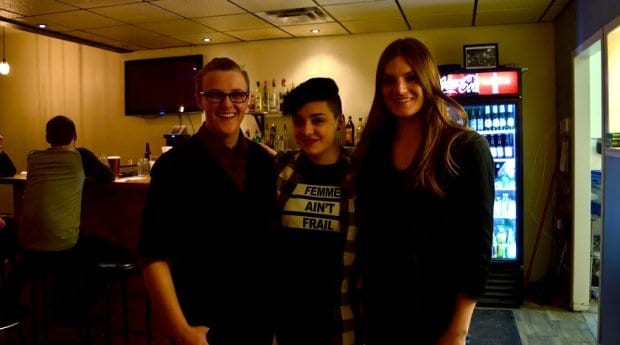Now in its third year, Genderfest Winnipeg aims to create a safe space to celebrate queer culture. For Joey Moore, the festival has accomplished its goal since day one.
Moore, a former Rainbow Resource Centre and University of Winnipeg LGBT Centre employee, has come out twice at the festival — first as queer, then as transgender.
“It’s a community group that has been really important to me and really supportive of me,” Moore says. “I knew that was the safest space I could come out in.”
Having sported Blundstone boots, plaid shirts and a haircut affectionately called a “dyke spike” in school, it wasn’t until Moore went to the festival’s dance party a few years ago that he came out as queer. On Feb 6, Moore gave a speech at this year’s Genderfest showcase, called Different Strokes for Different Folks: A Showcase of Local Queer Artists and Performers.
In his speech, Moore talked about his journey coming out as queer, then revealed that his journey is still continuing, now as a trans person.
Winnipeg’s homegrown Genderfest allows community members to create their own events, ranging from this year’s She Speak Sweet Talk: Feminist Porn Readings to several presentations by Vermont activist Eli Clare, who will discuss queerness and disability at workshops and talks from Feb 13 to 15. “Each year it’s very different what kind of things happen at Genderfest. It’s really exciting to see the set list,” Moore says.
The topic of ability is especially important this year, after organizers received complaints that last year’s events weren’t all staged in accessible spaces.
“We totally recognized that and acknowledged it and made sure that this year everything is physically accessible for everyone,” organizer Taylor Kell says. “I think a really awesome thing about us organizers that are involved is that we all appreciate getting criticism or being called out on stuff that we need to improve on.”
Genderfest opened Jan 31 and will run until Feb 14. “So far, it has been really awesome,” Kell says.
The festival began as the University of Winnipeg’s Genderweek, which Kell also coordinated, before participants suggested the festival be lengthened to two weeks.
“I think one of the main goals that we’ve always had is to create safer spaces for folks that don’t necessarily always have places to go and party, places to go and have their voice heard or just be able to celebrate who they are,” Kell says.
Moore agrees. “It’s supposed to be an all-inclusive environment where regardless of your ability, your sex, your gender, your sexual orientation, your race, you’re able to go out into the community where you feel safe and where you feel welcome.”
For the full list of events, search for “Genderfest Winnipeg” on Facebook.

 Why you can trust Xtra
Why you can trust Xtra


